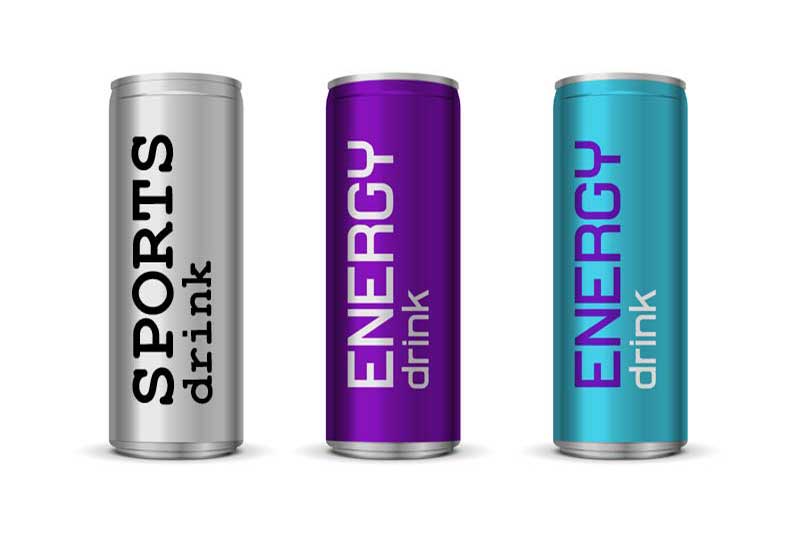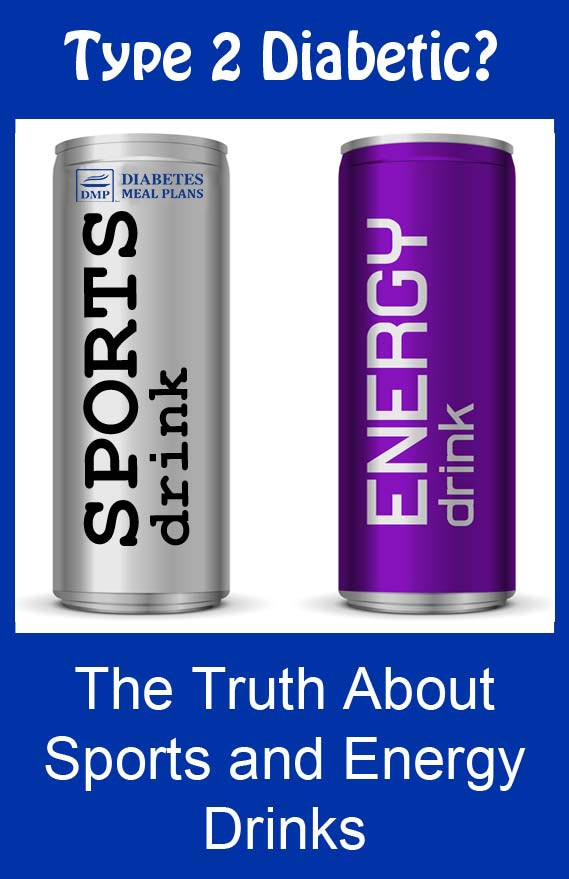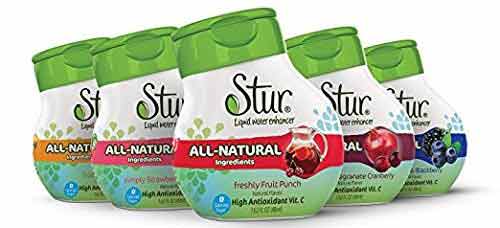Unless you come from another planet, you’ve probably encountered energy drinks and sports drinks at some point in your life.
Once upon a time, you may have regularly pounded back a Red Bull every morning. Or maybe you’d indulge in the occasional Gatorade after an intense sports game, or stressful day at work.
Hopefully now that you know you’ve got diabetes or prediabetes, you’re not continuing with these energy/ sports drink habits.
Because… although they may be marketed as a great option to pep you up or recover, these elaborately-packaged, often colorful beverages have close ties to the soft drink industry.

The sports drink Gatorade, for example, is manufactured by PepsiCo, and Pepsi itself was originally marketed as an energy drink due to its caffeine and cocaine. Yes, you read that right! Once upon a time it contained cocaine!
Both energy drinks and sports drinks are extremely popular and widely consumed, but if you haven’t worked it out already, they are not a good option for type 2 diabetes. And here’s why…
What are Sports Drinks?
Sports drinks are intended to rehydrate and replenish electrolytes (such as sodium and potassium) in athletes before, during, and after strenuous physical activity. They are generally comprised of water, sugar, and electrolyte salts, but can also contain artificial ingredients such as coloring agents — think bright blue and pink drinks — that’s not exactly natural!
These drinks’ principal ingredients each serve a nutritional purpose: water provides the hydration necessary for all bodily functions, sugar is a source of carbohydrates which fuel the body, and salt rebalances electrolyte levels.
Electrolytes are substances that, when dissolved in water, produce a solution that can conduct electricity. Humans need electrolytes to live, but they are lost when we exert ourselves and sweat.
What are Energy Drinks?
Energy drinks contain stimulant substances (usually caffeine) and are marketed as useful for increasing wakefulness and alertness. They are often carbonated and sold in cans, and generally contain sugar, taurine, and herbal extracts such as ginseng or guarana.
These drinks are often advertised as being nutritious due to their ‘added’ vitamins.
As an example, Powerade contains (per cup) contains:
- 21% Recommended Daily Value (RDA) niacin
- 29% RDA vitamin B6
- 93% RDA vitamin B12
- 2% RDA magnesium and vitamin B3
But just because something contains ‘added’ vitamins, doesn’t make it healthy.
Obviously, there are many healthier, low carb food sources that naturally contain these vitamins such as eggs, fish, lean meat, and dark leafy greens.
Sports & Energy Drinks Nutrition Facts
The calorie contents of both sports drinks and energy drinks do vary quite a bit.
For instance, eight ounces of lemon-lime flavored Powerade contains 78 calories, while eight ounces of Pipeline Punch flavored Monster Energy drink contains 101 calories.
Other than the calories, it’s important to keep a few things in mind when reading the nutrition labels of these drinks.
First, sports drinks are often sold in large (32 ounce or bigger) bottles, so the nutrition statistics on the label must often be tripled or quadrupled if you drink the whole bottle.
Second, although these beverages aren’t considered high calorie, they are high in carbohydrates/ sugar, which is not ideal for type 2 diabetics.
Those eight ounces (240mL) of Powerade contain 15 grams of sugar and 19 grams of carbohydrates, and the same amount of Monster Energy packs 23 grams of sugar and 24 grams of carbohydrates. And remember – most people drink more than just eight ounces of these beverages!
So basically, you’re just consuming pure sugar in one big hit. And you know what happens when you do that?
Up goes your blood sugar levels, fast!
Everyone knows by now that soft drinks (aka soda) aren’t healthy, particularly if you have type 2 diabetes and are trying to follow a low carb diet, which is what we encourage people to do — because it works!
But both energy drinks and sports drinks can really be lumped into the same category as soft drinks/ sodas. They are no good for you.

Research about Sports and Energy Drinks and Diabetes
Consuming sugar-sweetened beverages such as sports and energy drinks has been linked to increased risk of developing obesity and type 2 diabetes.
If you already have weight issues or diabetes, higher intake of these beverages won’t help treat the disease as they are associated with increased visceral adipose tissue (belly fat) volume, which drives up inflammation and ill health.
Surprisingly, sugar-sweetened beverages are also among the ten foods identified as being linked to diabetes-related deaths in the United States.
Recent animal studies suggest that energy drinks may cause liver damage, which is worsened when consumed with alcohol. They can also increase systolic blood pressure. Since around 80% of type 2 diabetics already have issues with blood pressure, well…it’s pretty obvious these drinks are not for you.
Look, sugar- sweetened beverages have a TON of research around them and let’s just say, none of it is good.
Healthy “Energy/ Sports Drink” Options
There is a healthy carbonated drink option, one that is completely sweetener free: club soda or seltzer water. And LaCroix, Dasani and many other companies make flavored (unsweetened) varieties as well.
LaCroix flavor their sparkling waters with natural flavors that are often fruit extracts and essential oils. They contain zero sugar, zero sweeteners, zero carbs and come in a variety of flavors – berry, coconut, lemon and orange.
Alternatively, you can purchase a variety pack (pictured above) – 24 cans for around $24.95 makes them just $1.24 each.
Another option is to infuse your water or sparkling water with fruit (strawberries, cucumber, lemon, lime) or herbs (mint, thyme) or brew it with an herbal tea to give a bit more flavor.
You can also purchase stevia sweetened flavorings to add to your water. Stur water enhancers are a great choice. Natural ingredients, sweetened with stevia and contain zero carbs.

So are Sports and Energy Drinks Good for Type 2 Diabetics?
No. They are not smart choices at all, due to their high carbohydrate and sugar content.
Water is a much healthier alternative that should be chosen nearly 100% of the time.
By drinking water, you’ll keep your waistline trim, your blood sugar regular and you’ll stay hydrated!
If you feel like you need an energy boost drink coffee, caffeinated tea or green tea.
After a strenuous workout, opt for a more natural option to re-hydrate and replace electrolytes, such as unsweetened coconut water, which also provides a range of antioxidant benefits. Or try one of the above “healthier” beverage options.
Please pin, tweet or share this info to help others. Thanks!


jim
Jedha, very informative! I would hope most of your regular followers are, by now, reading the labels and would figure it out for themselves but I really like the way you say it, “Are they good for you? NO!” Right to the point.
As I read this a few pet peeves came to mind and I just needed to take the opportunity to get it off my chest. My grandson, 7 years old, about once a month has us go out on litter patrol. We live in very rural New Hampshire. Next to beer cans, energy drink containers, including the little plastic bottles, have become the most common container we pick up. I don’t know if that reflects on what energy drinks do to peoples minds but it is a poor statement about consumers.
My second pet peeve, totally unrelated to this topic, is that so many package instructions have cooking instructions that don’t agree with serving size. If your not paying attention you can really get messed up. An example: I like a frozen sausage link with my breakfast. Maybe not the best choice, but I like them. A serving size is 3 links. Cooking Instructions are for 5 or 10. What is up with that? I do feel like it is a conspiracy!
Oh well. I guess I have too much time on my hands.
Jedha
Good pet peeves to have Jim! In terms of litter, people are very disrespectful and in terms of food labels, that’s what manufacturers secretly hope for but it is very deceiving! Elizabeth and I are currently putting together a food labels course because there are many misconceptions and people really do need to pay more attention to important things on labels and not just the shiny wrapper on the front.
I don’t think you have too much time on your hands, it’s great to think about things on a deeper level. I agree that many things actually are a conspiracy!